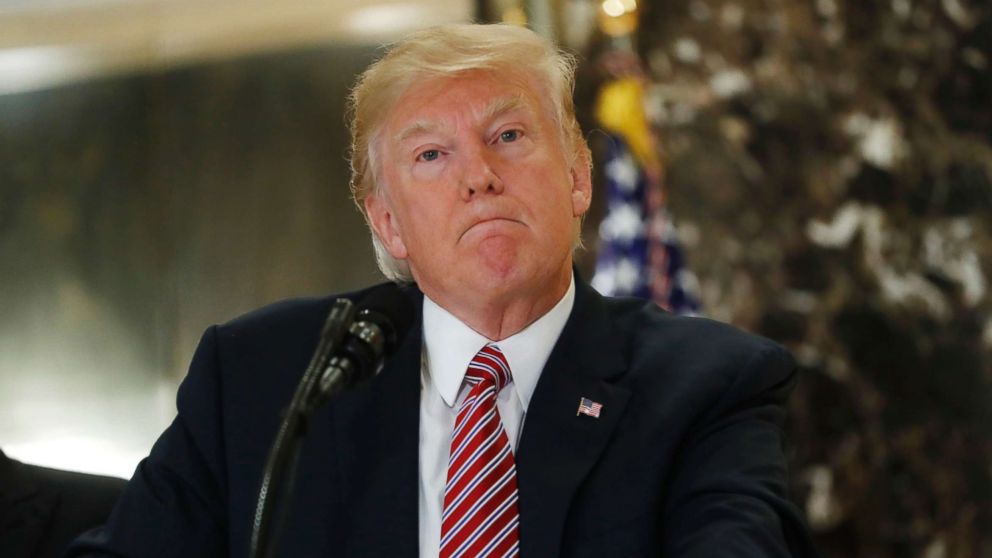Unpacking the controversy over what Trump has said, and not said, on Charlottesville
— -- The reverberations from the violence in Charlottesville continue to echo as President Donald Trump faces further fallout from his handling of the situation.
Members of his own party have come out against his response and now two of his economic councils have disbanded as business leaders distance themselves from his remarks about the nature of the crowds in Charlottesville.
Here's how the events in recent days have led to Trump's latest turmoil.
Chaos in Charlottesville
The activity this past weekend in the small college town centered around a protest of the planned removal of a statue of Gen. Robert E. Lee, who commanded the Confederate army during the Civil War.
The events started on Friday, Aug. 11, when a large group of people -- many of whom were carrying lit tiki torches -- marched through the University of Virginia campus. Many members of the crowd were seen wearing Nazi-related clothing and at points chanting anti-Semitic cries.
The planned rally came the next day, and the members of the groups protesting the removal of the statue, including a number of so-called alt-right groups and white supremacists and neo-Nazis, were confronted by counterprotesters.
Violent clashes ensued, and Virginia Gov. Terry McAuliffe ultimately declared a state of emergency in Charlottesville just before noon in response to the violence.
The most violent incident occurred at 1:42 p.m., when a car rammed into a crowd of people demonstrating against the white nationalist gathering, killing a 32-year-old woman and injuring others.
Trump's initial responses
First lady Melania Trump was the first member of the Trump family to respond to the violence, posting a call to "communicate w/o hate in our hearts" on Twitter.
Her husband followed suit, writing that "We ALL must be united & condemn all that hate stands for," before making his first public statement in Bedminster, New Jersey.
"We condemn in the strongest possible terms this egregious display of hatred, bigotry and violence on many sides. On many sides," he said, without going on to mention or directly call out the white supremacists and neo-Nazis involved.
[To read a full timeline of all of Trump's statements and tweets, click here.]
A number of Republicans, including two of Trump's former rivals, Sens. Marco Rubio and Ted Cruz, issued statements using harsher words than Trump. Cruz named the groups and called them "repulsive and evil," while Rubio wrote on Twitter that it was "Very important for the nation to hear @potus describe events in #Charlottesville for what they are, a terror attack by #whitesupremacists."
The following morning, Sunday, Aug. 13, a White House spokesperson who would not be publicly identified clarified Trump's statement, saying that his condemnation "of course that includes white supremacists, KKK, neo-Nazi and all extremist groups."
A clearer condemnation
After nearly two full days of criticism from members of his own party and the public, Trump made another statement from the White House, where he was more direct.
"Racism is evil. And those who cause violence in its name are criminals and thugs, including the KKK, neo-Nazis, white supremacists and other hate groups that are repugnant to everything we hold dear as Americans," Trump said Monday.
His statement was seen as being "too little, too late," by some critics, including Jonathan Greenblatt, the director and CEO of the Anti-Defamation League.
"Let's be clear: I think we should expect our leader in the highest office in the land to step above the lowest possible bar," Greenblatt said on a call with reporters on Monday shortly after Trump's comments.
"We have seen a pattern of the president equivocating” when it comes to denouncing hate groups, including white supremacists and anti-Semitic groups, Greenblatt said.
Doubling down
On Tuesday, Trump took questions at a press conference about infrastructure reform plans and ended up lashing out at the media, questioning the nature of the crowds in Charlottesville and defending his initial "excellent" statement.
"I think there is blame on both sides. You look at both sides. I think there is blame on both sides," he said.
"You had some very bad people in that group. You also had some very fine people on both sides,” he added.
The press conference prompted outcry once again, and a number of key Republicans reiterated that they stand against racism.
"We must be clear. White supremacy is repulsive. This bigotry is counter to all this country stands for. There can be no moral ambiguity," House Majority Leader Paul Ryan, R-Wis., wrote on Twitter about an hour and a half after the news conference.
One of the first ones to respond, however, was David Duke, former imperial wizard of the Knights of the Ku Klux Klan, who tweeted, "Thank you President Trump for your honesty & courage to tell the truth about #Charlottesville & condemn the leftist terrorists in BLM/Antifa," he wrote, apparently referring to the Black Lives Matter and the anti-fascist movements.
The pushback from establishment Republicans carried on today, with Republican National Committee Chairwoman Ronna Romney McDaniel speaking to "Good Morning America" and telling white supremacists, "We don't want your vote, we don't support you, we'll speak out against you."
Trump's remarks also led several business leaders to leave the American Manufacturing Council beginning on Monday, with the president eventually announcing on Twitter Wednesday that he was disbanding the manufacturing council and the separate Strategic and Policy Forum.




